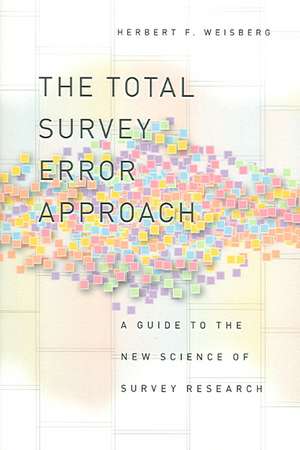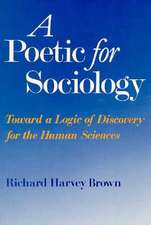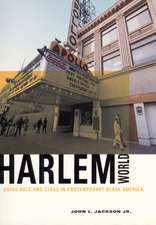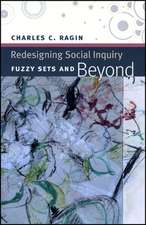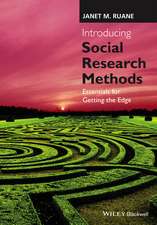The Total Survey Error Approach: A Guide to the New Science of Survey Research
Autor Herbert F. Weisbergen Limba Engleză Paperback – 25 oct 2005
In 1939, George Gallup's American Institute of Public Opinion published a pamphlet optimistically titled The New Science of Public Opinion Measurement. At the time, though, survey research was in its infancy, and only now, six decades later, can public opinion measurement be appropriately called a science, based in part on the development of the total survey error approach.
Herbert F. Weisberg's handbook presents a unified method for conducting good survey research centered on the various types of errors that can occur in surveys—from measurement and nonresponse error to coverage and sampling error. Each chapter is built on theoretical elements drawn from specific disciplines, such as social psychology and statistics, and follows through with detailed treatments of the specific types of error and their potential solutions. Throughout, Weisberg is attentive to survey constraints, including time and ethical considerations, as well as controversies within the field and the effects of new technology on the survey process—from Internet surveys to those completed by phone, by mail, and in person. Practitioners and students will find this comprehensive guide particularly useful now that survey research has assumed a primary place in both public and academic circles.
Herbert F. Weisberg's handbook presents a unified method for conducting good survey research centered on the various types of errors that can occur in surveys—from measurement and nonresponse error to coverage and sampling error. Each chapter is built on theoretical elements drawn from specific disciplines, such as social psychology and statistics, and follows through with detailed treatments of the specific types of error and their potential solutions. Throughout, Weisberg is attentive to survey constraints, including time and ethical considerations, as well as controversies within the field and the effects of new technology on the survey process—from Internet surveys to those completed by phone, by mail, and in person. Practitioners and students will find this comprehensive guide particularly useful now that survey research has assumed a primary place in both public and academic circles.
Preț: 353.38 lei
Nou
Puncte Express: 530
Preț estimativ în valută:
67.62€ • 70.60$ • 55.96£
67.62€ • 70.60$ • 55.96£
Carte tipărită la comandă
Livrare economică 04-18 aprilie
Preluare comenzi: 021 569.72.76
Specificații
ISBN-13: 9780226891286
ISBN-10: 0226891283
Pagini: 336
Ilustrații: 10 line drawings, 17 tables, 9 text boxes
Dimensiuni: 152 x 229 x 25 mm
Greutate: 0.55 kg
Editura: University of Chicago Press
Colecția University of Chicago Press
ISBN-10: 0226891283
Pagini: 336
Ilustrații: 10 line drawings, 17 tables, 9 text boxes
Dimensiuni: 152 x 229 x 25 mm
Greutate: 0.55 kg
Editura: University of Chicago Press
Colecția University of Chicago Press
Notă biografică
Herbert F. Weisberg is professor of political science and director of the Center for Survey Research at The Ohio State University. He is coauthor of Introduction to Survey Research, Polling, and Data Analysis, now in its third edition.
Cuprins
Preface
Part I - Survey Error Theory
1. Scientific Survey Research: The Development of a Discipline
2. Survey Error: The Establishment of a Paradigm
3. Survey Modes: Responses to Emerging Technologies
Part II - Response Accuracy Issues
4. Measurement Error Due to Interviewers: The Debate over Interviewing Style
5. Measurement Error Due to Respondents, I: Question Wording Problems
6. Measurement Error Due to Respondents, II: Questionnaire Issues
7. Nonresponse Error at the Item Level: The Scourge of Missing Data
Part III - Respondent Selection Issues
8. Nonresponse Error at the Unit Level: The Response Rate Challenge
9. Coverage Error: Sampling Frame Issues
10. Sampling Error: The Need for Representativeness
Part IV - Survey Administration Issues
11. Postsurvey Error: The Data Editing Stage
12. Mode Differences: Dealing with Sensitive Topics
13. Comparability Effects: The Limits of Equivalence
Part V - Total Survey Design
14. Ethics in Surveys: Respecting Respondents' Rights
15. Survey Errors: Coping with Survey Constraints
Appendix. Meta-analysis
Notes
References
Index
Part I - Survey Error Theory
1. Scientific Survey Research: The Development of a Discipline
2. Survey Error: The Establishment of a Paradigm
3. Survey Modes: Responses to Emerging Technologies
Part II - Response Accuracy Issues
4. Measurement Error Due to Interviewers: The Debate over Interviewing Style
5. Measurement Error Due to Respondents, I: Question Wording Problems
6. Measurement Error Due to Respondents, II: Questionnaire Issues
7. Nonresponse Error at the Item Level: The Scourge of Missing Data
Part III - Respondent Selection Issues
8. Nonresponse Error at the Unit Level: The Response Rate Challenge
9. Coverage Error: Sampling Frame Issues
10. Sampling Error: The Need for Representativeness
Part IV - Survey Administration Issues
11. Postsurvey Error: The Data Editing Stage
12. Mode Differences: Dealing with Sensitive Topics
13. Comparability Effects: The Limits of Equivalence
Part V - Total Survey Design
14. Ethics in Surveys: Respecting Respondents' Rights
15. Survey Errors: Coping with Survey Constraints
Appendix. Meta-analysis
Notes
References
Index
Recenzii
“Innovative and distinctive, this book will appeal to a wide scholarly audience, particularly those interested in a single volume that covers the area on a sophisticated and theoretical level, reviews most of the relevant literature, and gives the tools to actually do a survey.”
“The Total Survey Error Approach is well written and accessible. There is no other text that takes such a broad view of the field in such a straightforward fashion.”
“This book is appropriate for many survey research methods courses. It will be useful for both instructors and survey research professionals. I would use it in my survey methods class and recommend it to the staff in my organization.”
"An interesting account of survey research for statisticians, mathematicians and scientists who are interested in developing the practical aspects of knowledge for survey research."
"The science of survey methodology has at most acted as a brake on practitioners, preventing them from heading off too far in the wrong direction. As an accessible and thorough review of findings in survey methodology, this book is well able to apply such a brake."
"A very useful guide to current practices in the design and conduct of surveys."
